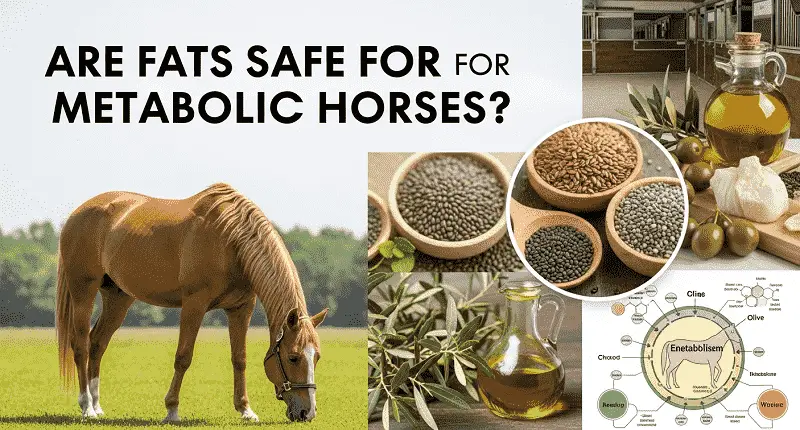Are you worried about the health of your metabolic horse? You’re not alone.
Many horse owners struggle with understanding the best diet for their beloved companions. One question that often arises is: are fats safe for metabolic horses? You might have heard conflicting advice, leaving you uncertain about what’s truly beneficial. This article aims to clear up those doubts and guide you in making informed decisions.
Imagine having peace of mind, knowing you’re giving your horse the best possible care. Dive in to discover the truth about fats, and learn how they can impact your horse’s health positively. Don’t miss out on this crucial information that could transform the way you care for your horse.
Fats And Equine Nutrition
Fats play a crucial role in equine nutrition. They provide a dense source of energy for horses. For metabolic horses, understanding fats becomes essential. These horses have specific dietary needs. Managing these needs can improve their health.
Role Of Fats In Horse Diets
Fats in a horse’s diet offer several benefits. They help maintain weight without sugar spikes. Fats are slow-burning energy sources. This is helpful for endurance and stamina. They also support a shiny coat and healthy skin. Horses can digest fats efficiently, unlike high-sugar feeds.
Types Of Fats Suitable For Horses
Not all fats are equal for horses. Choose fats that are safe and beneficial. Vegetable oils, like soybean and corn oil, are popular. Rice bran and flaxseed are also good choices. These fats provide omega-3 and omega-6 fatty acids. Coconut oil is another option, offering medium-chain fatty acids.
Introduce fats slowly into a horse’s diet. This helps avoid digestive upset. Monitor the horse’s weight and overall health. Adjust the fat intake as needed. Always consult with a veterinarian or equine nutritionist.
Metabolic Conditions In Horses
Understanding the metabolic conditions in horses is crucial for their health and wellbeing. Horses, much like humans, can suffer from metabolic disorders that affect their energy levels and overall health. As a horse owner, being aware of these conditions can help you manage your horse’s diet effectively.
Common Metabolic Disorders
Some horses develop Equine Metabolic Syndrome (EMS), which is akin to diabetes in humans. This condition leads to weight gain and insulin resistance. Another common disorder is Pituitary Pars Intermedia Dysfunction (PPID), often referred to as Cushing’s disease, where hormonal imbalances occur.
Both conditions require careful monitoring and specific dietary adjustments. You might notice your horse gaining weight easily or suffering from laminitis. These symptoms are not just minor inconveniences; they are signs that your horse needs a tailored nutritional plan.
Impact On Nutritional Needs
Metabolic disorders alter a horse’s nutritional needs significantly. Horses with EMS often need a low-sugar, low-starch diet. This is because high sugar content can exacerbate insulin resistance, leading to further health issues.
PPID horses may require a diet that supports muscle maintenance and energy levels, often involving increased protein. But what about fats? Are they safe for metabolic horses? Fats can be a beneficial energy source without the sugar spike. Consider adding fat sources like rice bran or flaxseed to your horse’s diet.
Have you considered the role of fats in your horse’s diet? Many owners overlook this aspect, yet fats can provide essential energy and support metabolic functions without causing spikes in blood sugar. It’s time to rethink what you feed your horse.
By understanding these conditions and their nutritional impacts, you can make informed decisions about your horse’s diet. Remember, each horse is unique, and what works for one may not work for another. Are you ready to adjust your horse’s diet for better health?
Evaluating Fat Safety
Evaluating fat safety in the diet of metabolic horses is crucial. These horses have specific dietary needs. Understanding these needs helps in maintaining their health. This section explores the benefits and risks of fats for them.
Benefits Of Fats For Metabolic Horses
Fats provide a concentrated energy source. They help reduce the reliance on carbohydrates. This is beneficial for horses with insulin resistance. Fats also support skin health and coat shine. They aid in maintaining healthy body weight. Including fats can improve endurance and stamina.
Potential Risks And Concerns
Excessive fat intake can lead to health issues. Digestive problems may arise from improper digestion. Some fats may cause inflammation. Balance is essential in the diet. Consult a veterinarian before adding fats. Watch for any adverse reactions in the horse.
Selecting The Right Fats
Fats play a crucial role in a horse’s diet, especially metabolic horses. Choosing the right fats is essential to ensure their health and well-being. The right fats can support energy levels without causing sugar spikes. This section will guide you through selecting the best fats for metabolic horses.
Criteria For Choosing Fats
Consider the horse’s specific dietary needs. Not all fats are suitable for every horse. Look for fats with omega-3 fatty acids. These support inflammation control. Avoid fats high in omega-6, which can cause inflammation. Check for the fat’s digestibility. Horses need easily digestible fats. Consider the fat’s source. Natural sources are often best. Lastly, ensure the fat is palatable. Horses should enjoy eating it.
Recommended Sources And Products
Flaxseed oil is a great choice. It is rich in omega-3s. Rice bran is another good option. It offers energy without sugar spikes. Coconut oil is also beneficial. It provides medium-chain fatty acids. Fish oil can be used sparingly. It is high in omega-3s but has a strong taste. Commercial fat supplements are available too. They often blend different oils for balance.
Feeding Strategies
Feeding strategies for metabolic horses require careful planning. Fats in the diet can be beneficial, but balance is key. Understanding how to incorporate fats while ensuring the horse’s overall health is crucial. Below are some strategies to help guide this process.
Balancing Fats In Diet
Metabolic horses can benefit from added fats. Fats provide energy without spiking sugar levels. Choose sources like rice bran or flaxseed. These provide healthy fats. Limit the amount to maintain balance. Aim for no more than 20% of the total diet. Too much fat can cause digestive issues. Observe your horse’s behavior and weight. Adjust the fat content if necessary.
Monitoring Health And Performance
Regular health checks are important for metabolic horses. Observe changes in weight and coat condition. These can indicate dietary issues. Performance levels can also signal health problems. A drop in energy might suggest diet adjustments. Always consult with a vet for guidance. They can help tailor a feeding plan. This ensures your horse stays healthy and active.

Credit: equineinstitute.org
Expert Insights
Understanding the safety of fats for metabolic horses is crucial. Horses with metabolic issues need special care. Experts provide valuable insights on this topic. Their research sheds light on the role of fats in equine diets. Let’s explore these insights.
Research Findings
Studies show that fats can be beneficial for metabolic horses. They offer a concentrated energy source. Fats help reduce the intake of sugars and starches. This is important for horses with insulin resistance. Research indicates fats do not spike blood sugar levels. Thus, they can be a safer energy option.
Veterinarian Recommendations
Veterinarians suggest incorporating fats gradually into the diet. They recommend starting with small amounts. This helps the horse adapt. Choose high-quality fat sources like flaxseed or rice bran. These are easier to digest. Regular monitoring is essential. It ensures the horse maintains a healthy weight. Consult a vet for personalized advice.
Frequently Asked Questions
What Are Metabolic Horses?
Metabolic horses have conditions affecting their metabolism, like Equine Metabolic Syndrome (EMS) or Cushing’s Disease. These conditions require careful dietary management. Fats can be a crucial component of their diet, providing energy without increasing blood sugar levels. It’s essential to consult a veterinarian for the best dietary plan.
Can Fats Help In Weight Management For Metabolic Horses?
Yes, fats can aid in weight management for metabolic horses. They provide energy without spiking blood sugar. Unlike carbohydrates, fats help maintain stable insulin levels. A balanced diet with appropriate fat levels can support weight control. Always consult a veterinarian before making dietary changes.
Are All Fats Safe For Metabolic Horses?
Not all fats are safe for metabolic horses. Choose fats that are low in sugar and starch. Common safe fat sources include flaxseed oil, rice bran, and fish oil. Avoid fats that might contain harmful additives or high sugar content.
Consult with a veterinarian for specific recommendations.
How Much Fat Should Metabolic Horses Consume?
The amount of fat for metabolic horses depends on their individual needs. Generally, 5-10% of their total diet can be fats. It’s crucial to balance fat intake with other nutrients. Always follow a veterinarian’s guidance to ensure the diet supports the horse’s health and metabolic condition.
Conclusion
Understanding fats for metabolic horses is crucial for their health. Choosing the right fats supports energy and digestion. Consult with a vet before adding fats to their diet. It’s essential to monitor their weight and behavior. Adjust their feed based on their needs.
Balance is key for metabolic health. Pay attention to any changes in their condition. Proper care ensures your horse thrives. With mindful feeding, metabolic horses can live happily. Always prioritize their well-being and stay informed. Keep learning about their unique dietary needs.
Your horse depends on you for a healthy life.






